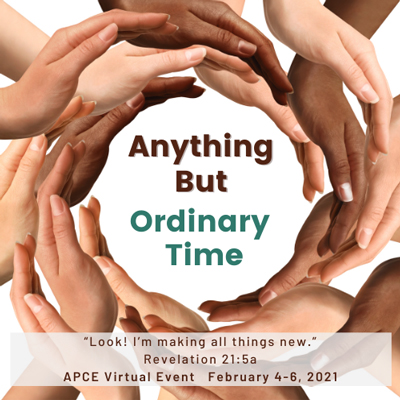APCE workshop aims to help parents help children nurture their faith
by Mike Ferguson | Presbyterian News Service

Dr. Robert and Laura Keeley presented a workshop called “Supporting Parents in Faith Nurture” during last week’s online APCE national event. (Photo courtesy of 14th Street Christian Reformed Church)
LOUISVILLE — Children’s faith is being formed in everyday moments — taking a walk with mom or dad, being tucked into bed, sharing a meal together.
“Faith is mysterious, and God is too big for me to figure out,” Dr. Robert Keeley said last week during a workshop he and his wife, Laura, put on during the Association of Presbyterian Church Educators’ national gathering. More than 175 people attended the Keeleys’ online workshop, “Supporting Parents in Faith Nurture.”
Robert Keeley teaches at Calvin University and Calvin Theological Seminary. Laura Keeley is a regional catalyzer for Faith Formation Ministries in the Christian Reformed Church of North America. Together they direct children’s ministries at 14th Street Christian Reformed Church in Holland, Michigan.
“Faith formation takes place whether we like it or not,” Laura said. “They are learning from you what it’s like to be an adult and a Christian adult.”
The Keeleys are the authors of “Dear Parent: A Guide for Family Faith Formation.”
“We want to equip parents to get their kids ready to catch the winds of the Holy Spirit,” Robert said. “The good news,” Laura added, “is that we are not doing this alone.”
At the church they serve, a family living in the Keeleys’ neighborhood used to have to shoo away one of their children’s friends every Sunday morning so the family could go to church. The parents reasonably decided one week, with her mother’s consent, to invite the child to church — and she liked it. “She would tell her mother she was going,” Laura said. By the time the girl was in sixth grade, she would bring food to church potlucks. She professed her faith in church as an eighth grader.
“There is no reason she should have come to our church and done all that,” Laura said. “Our goal is to encourage you to help children find their place in God’s family, know God’s story, live in hope and discover their calling.”
The Keeleys then shared four building blocks of faith, which they developed. Rather than use the building blocks as a step-by-step program, they suggested using them as a framework:
- I belong. Parents can remind their children of their baptism. On their birthday, they can read the psalm that corresponds to the birthday they’re celebrating. At bedtime, Laura suggested a ritual that includes statements like these: “You belong to God. You are a child of God. God loves you.” Talk about the church positively and take an interest in the child’s church life. Perhaps most importantly, find authentic ways for your children — especially once they’re teenagers — to be involved in worship.
- I know. “I know the story of God’s faithfulness, in which I am a part,” is a lesson parents ought to pass along to their children, Robert said. As children are hearing a Bible story, parents can wonder out loud “about what God is doing in the story,” he said. “Don’t be afraid to say, ‘I don’t know.’ And don’t feel you have to read the whole Bible to your kids,” such as the Book of Numbers, he said. “You’re going to lose them.”
- I have hope. We often misuse the term, Laura said, including “I hope my team wins” or “I hope they get here soon.” True hope is more akin to the hope Naomi experiences near the end of the Book of Ruth, she said. Recount to your children the ways that God has been faithful to your family, she suggested, and take time to lament when it’s appropriate. “Watch for and talk about the way the Lord answers prayers and read the psalms” with your children, she said.
- I am called and equipped. Tell your children the stories of faith of members of the congregation or friends who are following their calling, the Keeleys said. Invite other adults to talk to young people about how they arrived at deciding where God was calling them. Realize that “lots of organizations build up God’s kingdom without doing so explicitly,” including public schools. Have adults talk about what it means to be a Christian plumber, teacher or doctor. These are stories “we should be hearing and our kids should be hearing,” Robert said. “Affirm the gifts your kids have been given. Children need to be nurtured by the whole community of faith, not just their parents.”

“Parenting is not easy. We don’t want to dump more responsibility on parents,” he said. “Most are doing what they can. We hope these four building blocks will highlight things that are already going on.”
For example: a church member once told him, “I never knew why we had coffee after church. Now I get it.”
“We do things,” he said, “without realizing they have impact on faith formation.”
![]() You may freely reuse and distribute this article in its entirety for non-commercial purposes in any medium. Please include author attribution, photography credits, and a link to the original article. This work is licensed under a Creative Commons Attribution-NonCommercial-NoDeratives 4.0 International License.
You may freely reuse and distribute this article in its entirety for non-commercial purposes in any medium. Please include author attribution, photography credits, and a link to the original article. This work is licensed under a Creative Commons Attribution-NonCommercial-NoDeratives 4.0 International License.
Categories: Christian Formation, Partner Associations
Tags: 14th street christian reformed church, anything but ordinary time, APCE, association of presbyterian church educators, calvin theological seminary, calvin university, children, christian reformed church of north america, dear parent: a guide for family faith formation, faith formation, four building blocks of faith, laura keeley, robert keeley, youth
Ministries: Office of Christian Formation, Worship, Partner Associations